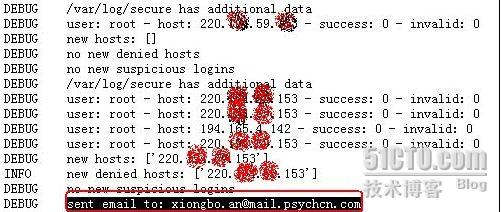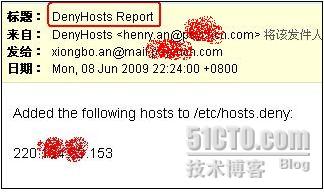Denyhosts 轻松应对SSH暴力破解
一.简介
DenyHosts
是一个设计用来阻止
SSH
非法连接的一个脚本程序。
DenyHosts
开发语言
python
主要特征:
- Parses /var/log/secure to find all login attempts and filters failed and successful attempts.
解析 /var/log/secure 文件,查找所有试图登录,对登录成功和失败的记录过滤。
解析 /var/log/secure 文件,查找所有试图登录,对登录成功和失败的记录过滤。
- Synchronization mode (new in 2.0) allows DenyHosts daemons the ability to share data via a centralized server to proactively thwart attacks.
同步模式
(2.0
以上版本
)
允许
DenyHosts
守护进程经中央服务器共享数据来主动阻止攻击
.
- Can be run from the command line, cron or as a daemon (new in 0.9)
支持命令行�p
cron
或做为一个守护进程运行
(0.9
以上版本
)
- Records all failed login attempts for the user and offending host
记录所有恶意登录失败的用户和主机
- For each host that exceeds a threshold count, records the evil host
记录所有超出阈值
,
恶意登录的主机
.
- Keeps track of each non-existent user (eg. sdadasd) when a login attempt failed.
记录每一个试图登录而失败的系统不存在的用户
.
- Keeps track of each existing user (eg. root) when a login attempt failed.
记录每一个试图登录而失败的系统存在的用户
.
- Keeps track of each offending host (with 0.8+ these hosts can be purged if the associated entry in /etc/hosts.deny is expired)
记录每一个恶意的主机
(
版本
>=0.8
如果与之相关的入口
/etc/hosts.deny
过期
,
这些记录的主机将被移除
)
- Keeps track of suspicious logins (that is, logins that were successful for a host that had many login failures)
记录可疑的登录
(
即
,
经过很多次失败登录才登录成功的主机
)
- Keeps track of the file offset, so that you can reparse the same file (/var/log/secure) continuously (until it is rotated).
记录文件的偏移量
,
以便能够连续不断的重复解析
/var/log/secure
这个文件
.(
直到文件被回滚
)
- When the log file is rotated, the script will detect it and parse from the beginning.
当一个日志文件被回滚时
,DenyHosts
脚本会察觉到变化
,
然后从头开始重新解析日志文件
.
- Appends /etc/hosts.deny and adds the newly banned hosts
新近的被禁用的主机附加到
/etc/hosts.deny
文件
.
- Optionally sends an email of newly banned hosts and suspicious logins.
可选的新近禁用的主机和可疑登录邮件通知功能
.
- Keeps a history of all user, host, user/host combo and suspicious logins encountered which includes the data and number of corresponding failed login attempts.
保留所有用
户�p主机�p用户/主机组合和可疑的登录,内容涉及登录失败的相关的数据和次数.
- Maintains failed valid and invalid user login attempts in separate files, such that it is easy to see which valid user is under attack (which would give you the opportunity to remove the account, change the password or change it's default shell to something like /sbin/nologin
在单独的文件里保留任何有效和无效的登录尝试
,
这样会很容易看到哪个有效用户处于被攻击
.(
它使你有机会移除这个账户
,
重置密码或改变账号默认的
shell.
如
/sbin/nologin
- Upon each run, the script will load the previously saved data and re-use it to append new failures.
当每次运行时
,DenyHosts
脚本会加载以前保存的数据并且会重新使用它
.
- Resolves IP addresses to hostnames, if available (new in v 0.6.0 ).
解析
IP
地址到主机名
,
如果有效
(
版本高于
0.6)
- /etc/hosts.deny entries can be expired (purge) at a user specified time (new in 0.8)
/etc/hosts.deny
在用户指定的时间会过期因而清除
(
版本
0.8
以上
)
- FreeBSD support (added in 0.7)
DenyHosts
支持
FreeBSD(
版本
0.7
以上
)
二.下载
http://ncu.dl.sourceforge.net/sourceforge/denyhosts/DenyHosts-2.6.tar.gz
三.安装
@
版本
DenyHosts-2.6.tar.gz
@python
版本
Python 2.4.3 (
系统已安装
)
检测方式
: #python �CV ,
如果没有安装
,
应该先安装一下
.
以下是具体安装
,
可以参考解压包根下的
README.txt
##########################################################:
# tar zxvf DenyHosts-2.6.tar.gz && cd DenyHosts*
# python setup.py install
##########################################################
注: 程序脚本默认安装目录是 /usr/share/denyhosts
注: 程序脚本默认安装目录是 /usr/share/denyhosts
库文件默认安装目录是
/usr/lib/python2.4/site-packages/DenyHosts
denyhosts.py
默认安装目录是
/usr/bin
四.配置
1.
制作系统服务脚本
# cp /usr/share/denyhosts/daemon-control-dist /etc/rc.d/init.d/denyhostsd
daemon-control-dist
为脚本模板文件
# chown root /etc/rc.d/init.d/denyhostsd
# chmod 700 /etc/rc.d/init.d/denyhostsd
# chmod 700 /etc/rc.d/init.d/denyhostsd
以上是给予脚本执行权限
2
.
Denyhosts
数据文件目录
/usr/share/denyhosts/data


用红框圈起的文件不存在,需要手动创建。
# touch allowed-hosts
# touch restricted-usernames
3.
主要配置文件
# sed -e '/#/d' -e '/^$/d' denyhosts.cfg-dist > denyhosts.cfg
# Redhat or Fedora Core: 安全日志位置
# Redhat or Fedora Core: 安全日志位置
SECURE_LOG = /var/log/secure
# 主机访问控制文件
# 主机访问控制文件
HOSTS_DENY = /etc/hosts.deny
# 清除时间 , 下边代表一周
# 清除时间 , 下边代表一周
PURGE_DENY = 1w
#
主机被清除的最大次数,默认是0
,
即不限制
PURGE_THRESHOLD =
2
#指定
DenyHosts
对哪个服务有效,如果是所有,可以设置为
ALL
BLOCK_SERVICE = sshd
#
允许无效用户登录失败的次数
DENY_THRESHOLD_INVALID = 5
#
允许有效用户登录失败的次数
(root
用户除外
)
,用户数据文件
/etc/passwd
DENY_THRESHOLD_VALID = 3
# 允许 ROOT 用户登录失败的次数
# 允许 ROOT 用户登录失败的次数
DENY_THRESHOLD_ROOT = 5
#
限制
restricted-usernames
文件列表中用户登录失败的次数
DENY_THRESHOLD_RESTRICTED = 5
# DenyHosts
数据保存目录
WORK_DIR = /usr/share/denyhosts/data
#
SUSPICIOUS_LOGIN_REPORT_ALLOWED_HOSTS=YES
#
是否域名反解
,
默认是
YES
HOSTNAME_LOOKUP=NO
#
进程锁文件
LOCK_FILE = /var/lock/subsys/denyhosts
#
受限主机和可疑主机报告接收邮件
ADMIN_EMAIL = henry.an@mail.***.com
SMTP_HOST = mail.***.com
SMTP_PORT = 25
#SMTP_USERNAME=
#SMTP_PASSWORD=
SMTP_FROM = DenyHosts <henry.an@***.com>
SMTP_SUBJECT = DenyHosts Report
#
用户的失败登录计数重置为
0
的时间
(/etc/passwd)
AGE_RESET_VALID=5d
#
root
用户失败登录计数重置为
0
的时间
AGE_RESET_ROOT=25d
#
用户的失败登录计数重置为
0
的时间
(/usr/share/denyhosts/data/restricted-usernames)
AGE_RESET_RESTRICTED=25d
#
无效用户的失败登录计数重置为
0
的时间
(/etc/passwd)
AGE_RESET_INVALID=10d
# DenyHosts
日志
DAEMON_LOG = /var/log/denyhosts
DAEMON_SLEEP = 30s
DAEMON_PURGE = 1h
# mkdir /usr/share/denyhosts/data
以上是
DenyHosts
生成的数据文件目录
五.调试
debug
模式起动
denyhostsd
# service denyhostsd start �Cdebug
# tail �Cf /var/log/denyhosts
//
以下附加
ip
到
/etc/hosts.deny
文件后发送邮件的日志

以下是邮件通知的内容:
